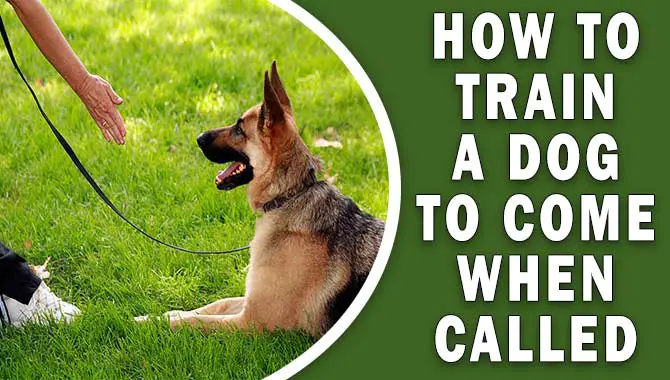Dogs are known for their playful and curious nature, but when it comes to digging holes in the yard or garden can be a frustrating and expensive problem for owners.
Digging is a normal behaviour for dogs and can be caused by a variety of factors, including boredom, anxiety or even genetics. Fortunately, there are several effective strategies to prevent dogs from digging.
We will explore some of the most successful methods to stop dogs from digging, including positive reinforcement training, environmental modification, and providing plenty of exercises and mental stimulation.
These techniques have been proven to work for dogs of all breeds and ages and can easily be incorporated into your daily routine. We’ll also discuss some common mistakes owners make when trying to prevent digging and offer tips on avoiding them.
Whether you’re a new dog owner or struggling with a chronic digger. How to stop a dog from digging? We will provide the tools and knowledge you need to help your dog overcome.
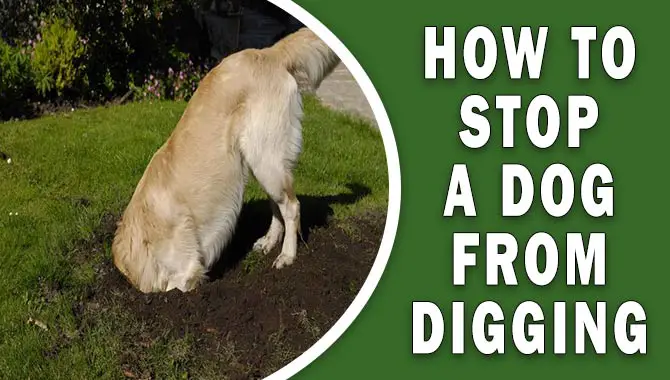
How To Stop A Dog From Digging – Tips And Tricks For Prevention
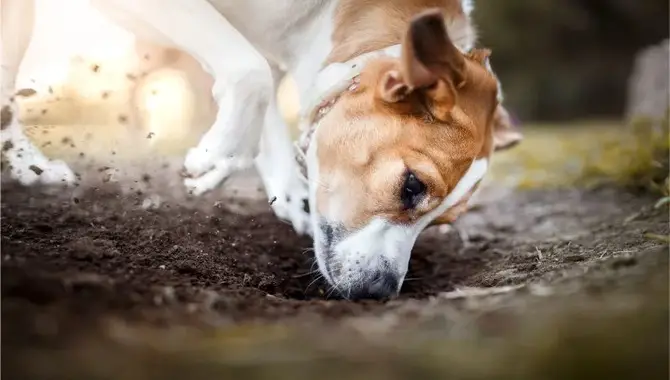
To help your furry friend stop digging, there are several effective strategies that you can use. Start by teaching your pup basic obedience commands such as “stop” and “leave it.” Another great tip is to create a designated digging zone where they can freely dig without damaging your lawn or flower beds.
Additionally, providing ample exercise and mental stimulation will keep them entertained and make them less likely to develop destructive habits. Using deterrents like chicken wire or cayenne pepper can also be helpful in stopping dogs from digging where they shouldn’t be. How to stop a dog from digging? Here are some tips and tricks for prevention:
1. Identifying The Triggers For Digging
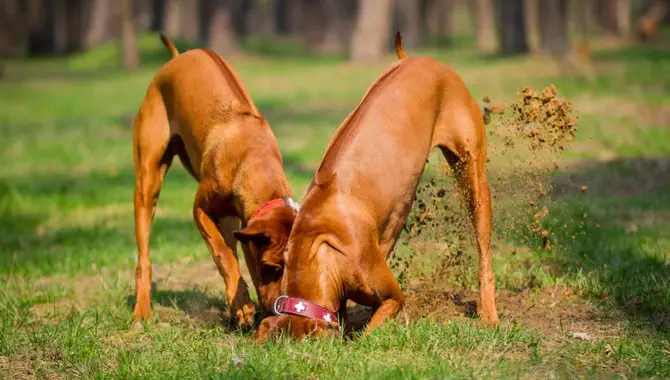
Dogs dig for various reasons, such as boredom, anxiety, hot weather, pests or critters in the yard, landscaping scents that attract them, and even excess energy. Identifying the triggers that lead to digging is essential so that you can address the root cause effectively.
To prevent this habit from forming, start by providing them with adequate exercise and mental stimulation through games or toys such as Frisbees or Kongs. Additionally, create a digging zone in your yard complete with designated areas for poop disposal and training purposes using a sandbox.
2. Addressing Boredom And Lack Of Exercise
Digging is a common trait that dogs possess for various reasons, like boredom and lack of exercise. To prevent this behaviour in your furry friend, offer them ample stimulation and activities like Kong toys or a cooling mat on hot days. Creating a designated digging area also helps pups satiate their urge without damaging landscaping or fences.
Deterrents such as large rocks or cayenne pepper around flower beds or vegetable patches where small critters reside are useful. Positive reinforcement training is one of the best ways to make your pup stop digging holes randomly all over the place. Consulting with a dog behaviourist could be beneficial too.
3. Providing Adequate Mental Stimulation
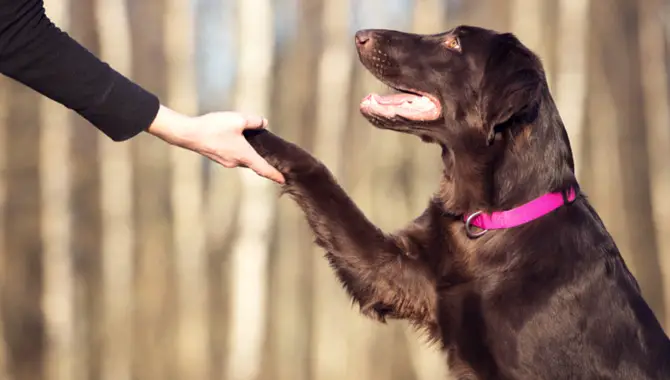
Dogs dig out of boredom or frustration; therefore, providing adequate mental stimulation is essential in stopping them from digging. Enrichment is the best way to tackle this problem. Digging pits or sandboxes can be created for dogs to satisfy their natural digging instincts without damaging landscaping.
Mental stimulation can be provided by introducing new toys and playing games like a frisbee to keep them entertained. Obedience training or agility classes can challenge the pup’s mind and reduce excess energy. Supervision and positive reinforcement training are crucial in creating a deterrent towards the dog’s digging habit.
4. Creating A Digging Area
Creating a designated digging area is an effective strategy to prevent dogs from ruining your landscaping. Start by choosing an appropriate spot in your yard where it’s acceptable for them to dig. You can entice them to use this “digging zone” by hiding their favourite toys or treats in it.
Be sure to make it clear that this spot is separate from other areas of the yard where they shouldn’t dig. Consistency is key when training your pup; redirect them to this designated area every time they start digging elsewhere.
5. Using Deterrents
Creating a designated digging area for your pup can redirect their digging habit effectively. Placing large rocks or chicken wire along the fence line can discourage dogs from digging in unwanted places like flower beds. Another approach is to use deterrents such as cayenne powder mixed with water or vinegar spray on your pups’ paws (only if they are not sensitive).
Providing sufficient mental stimulation, and physical exercise through games with dog toys and frisbees. And obedience training from a professional dog trainer is some of the other best ways to stop dogs from digging holes without damaging your landscaping.
6. Providing Positive Reinforcement Training
Teaching your pup not to dig is not impossible. Positive reinforcement training is essential, and rewarding good behaviour rather than punishing bad habits work best. Designated digging zones like sandboxes or patches of soil will help them redirect their instinct to dig holes in flower beds or vegetable gardens.
Enrichment activities like regular exercise and mental stimulation will provide much-needed relief for dogs that tend to dig excessively out of boredom or excess energy. Whether it’s hot weather or a hot day. Give sturdy toys they can play with or a kiddie pool where they can cool down.
7. Consistency And Persistence In Training
Training your pup not to dig requires consistency and persistence. Providing adequate mental stimulation and exercise is crucial for reducing boredom-related digging. Having a designated digging area with sandboxes or specific patches of soil can redirect your dog’s energy from flower beds or vegetable gardens.
Use positive reinforcement techniques such as praising good behaviour with treats or toys but avoiding punishing them for digging because it may worsen the habit. Also, consistently applying deterrents like chicken wire, cayenne pepper, or unpleasant smells in the same spots will help stop your dogs from digging there.
Seeking professional help from a dog trainer or a behaviourist is an excellent option for tackling separation anxiety or other underlying issues causing the digging habit.
8. Seeking Professional Help
If your furry best friend has developed a digging habit, consider seeking professional help to address it effectively. Whether it is due to boredom, excess energy, prey drive or separation anxiety. Consulting with a veterinarian will rule out any medical issues contributing to the problem.
Once cleared by a professional, working with a certified dog trainer or behaviorist can provide you and your pup with personalized guidance on how to stop dogs from digging holes in flower beds or landscaping features. Seeking professional help ensures you get tailored advice for stopping your pooch from wreaking havoc in your yard.
9. Common Mistakes To Avoid When Training Your Dog Not To Dig
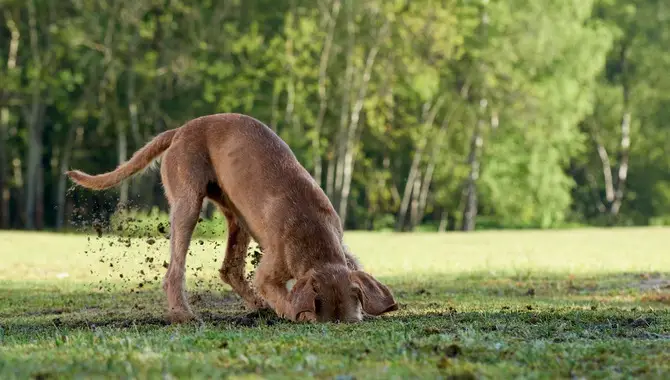
It’s essential to understand to stop a dog from digging by avoiding common mistakes during the training process. Rather than punishing them for digging holes, give your pup toys and designate a sandbox so that they can dig in an assigned area instead of ruining the landscaping or flower beds.
Besides this, consider using chicken wire or large rocks as deterrents to keep dogs away from areas that you want to protect. Consistency is key when training your best friend not to dig around the fence line or under the dog house.
Mental stimulation with activities like frisbee or a kiddie pool on a hot day may help reduce boredom and prevent excess energy from leading to digging habits.
10. Creating A Positive Environment For Your Dog

The best way is to create a designated digging zone, such as a sandbox or pit. Combine this with adequate physical exercise and mental stimulation to prevent boredom. During hot days make sure they have access to shade and water sources.
Positive reinforcement training techniques can also help encourage good behaviour. Seeking guidance from a professional dog trainer may be the first step towards preventing unwanted digging habits.
11. Training Strategies For Prevention
Teaching your furry friend to stop digging holes in your yard can be challenging. Redirect their behaviour by creating a designated digging zone like a sandbox or dig pit where they can satisfy their urge to dig without causing damage. Positive reinforcement, such as treats or toys, can also help discourage negative actions while promoting good behaviour.
Additionally, ensure they have plenty of physical activity and mental stimulation to prevent boredom and excess energy. You can train your pup to kick their digging habit for good with consistency and patience.
How To Deter A Dog From Digging In Your Yard
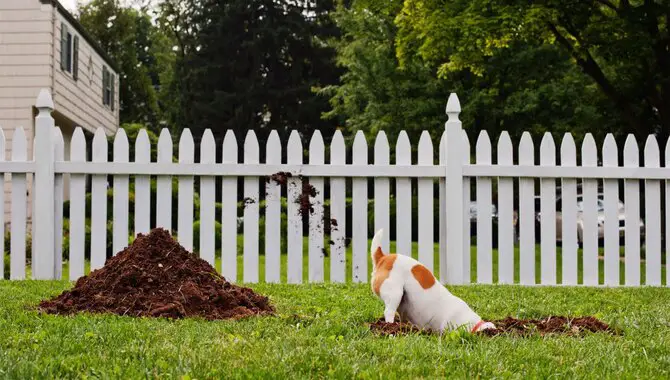
To stop your furry friend from digging up your yard constantly. Creating a dedicated digging zone where he can dig without getting into trouble is vital. Using chicken wire or fencing is advisable to block off areas where he tends to dig.
In addition, providing enough physical exercise and mental stimulation can help curb his excess energy and boredom, which may prompt him to dig holes. Positive reinforcement training techniques, such as rewarding him with special treats or toys for good behaviour, can also work wonders. If things don’t improve much, consulting a professional dog trainer or behaviorist may be helpful.
Conclusion
Digging is a common behaviour in dogs. How to stop a dog from digging? Preventing it can be challenging. However, you can help your furry friend overcome this habit with the right strategies.
By understanding the triggers for digging, providing adequate exercise and mental stimulation, and creating a designated digging area, you can redirect their behaviour and prevent destruction to your yard. Positive reinforcement training methods are also effective in shaping your dog’s behaviour.
Avoid common mistakes such as punishment-based training or inconsistency in training. With persistence and consistency, you will see positive results. Consistency and patience are key in training your dog to stop digging. With the right approach, you can enjoy a beautifully landscaped yard while providing your furry friend plenty of playtime and enrichment.
Frequently Asked Questions
Does Vinegar Stop Dogs From Digging?
Vinegar can act as a temporary deterrent to stop dogs from digging when diluted with water and sprayed in the affected areas. However, it may not work for all dogs and does not address the root cause of the behaviour. Identifying and addressing the underlying reason for the digging is crucial for a long-term solution.
Do Coffee Grounds Stop Dogs From Digging?
Although it is a common belief, there is no scientific evidence to prove that coffee grounds can prevent dogs from digging. Instead, consider training your dog or providing designated digging areas. Consult with a professional for safe and effective methods to prevent unwanted digging.
Do Dogs Grow Out Of Digging?
While some dogs may outgrow digging as they mature, it’s not guaranteed. Factors like boredom, anxiety, and prey drive can cause them to continue the behaviour. Providing mental and physical stimulation and seeking advice from a vet or professional trainer can help reduce it.
Why Is My Dog Obsessively Digging?
Dogs may dig excessively due to various reasons like boredom, anxiety or instinct. Finding the root cause is crucial. Adequate exercise and mental stimulation can help reduce this behaviour. Consultation with an animal behaviourist or vet is recommended for severe cases.
How Can I Redirect My Dog’s Digging Behaviour To A More Appropriate Activity?
To redirect your dog’s digging, create a designated area and encourage its use with positive reinforcement. Bury toys or treats in the area to entice them. Provide alternative activities to keep their minds occupied and reduce the likelihood of unwanted digging behavior.

Aquarium passion is all about connecting with the aquatic life and providing education to the public on the importance of these creatures. We showcase a wide variety of marine life through our exhibits as well as working with schools to provide unique learning opportunities for students of all ages.

